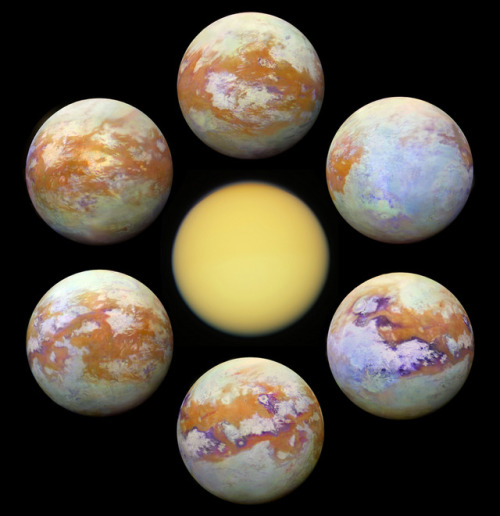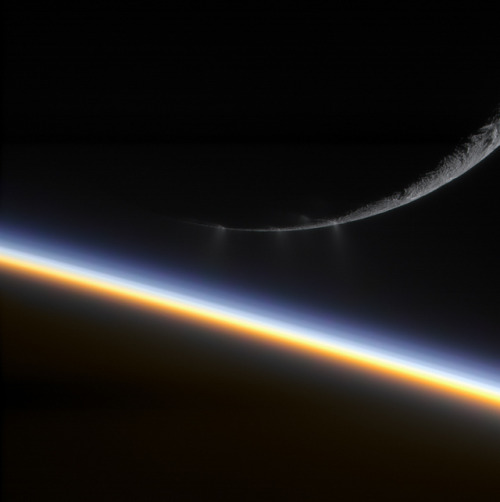Dust, Stars, And Cosmic Rays Swirling Around Comet 67P/Churyumov–Gerasimenko, Captured By The Rosetta
Dust, stars, and cosmic rays swirling around Comet 67P/Churyumov–Gerasimenko, captured by the Rosetta probe. (Source)
More Posts from Astrosciencechick and Others

Seeing Titan : Shrouded in a thick atmosphere, Saturn’s largest moon Titan really is hard to see. Small particles suspended in the upper atmosphere cause an almost impenetrable haze, strongly scattering light at visible wavelengths and hiding Titan’s surface features from prying eyes. But Titan’s surface is better imaged at infrared wavelengths where scattering is weaker and atmospheric absorption is reduced. Arrayed around this centered visible light image of Titan are some of the clearest global infrared views of the tantalizing moon so far. In false color, the six panels present a consistent processing of 13 years of infrared image data from the Visual and Infrared Mapping Spectrometer (VIMS) on board the Cassini spacecraft. They offer a stunning comparison with Cassini’s visible light view. via NASA
But not just my body... my mind, my heart.
I hope the next thing I get addicted to is taking care of my self and loving my body



Solar flares produce gamma rays by several processes, one of which is illustrated here. The energy released in a solar flare rapidly accelerates charged particles. When a high-energy proton strikes matter in the sun’s atmosphere and visible surface, the result may be a short-lived particle – a pion – that emits gamma rays when it decays.
Credit: NASA’s Goddard Space Flight Center

Central Cygnus Skyscape via NASA https://ift.tt/2vgpcsn




‘That was a quick flight’: How astronauts kept ice cool while their rocket malfunctioned at 4,970mph and plummeted back to Earth in harrowing 7G 'ballistic re-entry’ before hugging their loved-ones on the landing pad as Russia opens CRIMINAL probe.
Two astronauts kept ice cool as their rocket traveling at thousands of miles an hour malfunctioned on the edge of space while carrying them to the International Space Station, cockpit audio reveals.
Russian Aleksey Ovchinin and American Nick Hague made it back to Earth alive this morning after the booster on their Soyuz rocket broke at 164,000 feet and the rocket automatically turned back during a dramatic 7G 'ballistic re-entry’.
Ovchinin retained an enviable sang-froid as he realised what was happening, after they were rocked violently around in their seats by the force of the booster malfunction.
'An accident with the booster, 2 minutes, 45 seconds. That was a quick flight,’ he said in a calm voice in a streamed video of the incident.
'We’re tightening our seatbelts,’ Ovchinin said on the video.
At that moment the two astronauts were experiencing weightlessness, when in an ordinary launch they should still have been pinned to the back of their seats by the force of the rocket surging upwards at 4,970mph.
Russia says it has opened a criminal investigation and grounded all Soyuz flights. The accident comes weeks after a hole was discovered in the International Space Station amid talk from the Russian space authorities of deliberate sabotage.
Video footage from the launch at the Baikonur Cosmodrome shows a large plume of smoke coming from the rocket at the moment it failed and footage from inside the capsule shows the two astronauts being violently shaken about.
The accident bears similarities to the 1986 Challenger disaster when one of its boosters failed at lift-off causing an explosion that killed seven.
Astronauts have been involved in Soyuz malfunctions twice before, one in 1983 when a crew was forced to eject from a Soyuz rocket as it exploded on the launchpad. In 1975 a Soyuz capsule crashed back to Earth from 90 miles up after a rocket failure, but the crew survived.
The rocket, which was designed in the 1960s, has also had one booster fail in similar fashion to today’s malfunction. In 2002 a booster rocket malfunctioned and the rocket which was carrying a satellite crashed in Kazakhstan killing one person on the ground.
In total Soyuz rockets have been launched 745 times of which 21 have failed. Thirteen of those failures have been since 2010, calling into question the continued reliability of the rocket.
Search and rescue teams were scrambled to the touchdown location as NASA revealed the descent meant the Russian-built Soyuz MS-10 spacecraft had to take 'a sharper angle of landing compared to normal’.
The Russians have suspended Soyuz flights to the space station while they investigate the cause of the booster failure.
The Soyuz is the only way to get people to the space station at the moment but officials insist the astronauts currently on the space station have enough supplies.
NASA rookie Nick Hague and second-time flyer Aleksey Ovchinin of the Russian space agency were setting off for a six-month mission at the International Space Station Thursday, on a relatively rare two-man launch.
A spokesperson for NASA said that rescue teams have now reached Hague and Ovchinin and they’ve been taken out of the capsule and were in 'good condition’.
The craft’s landing engines and parachute system were said to have done their job as normal despite the enormous G-force acting on both the shuttle and crew during the landing.
Shortly after the incident rescue crews and paratroopers were rushed the emergency landing site in the barren Kazakh steppe to provide support for the crew.
NASA had issued a worrying tweet on Thursday morning saying: 'There’s been an issue with the booster from today’s launch. Teams have been in contact with the crew.’
'The capsule is returning via a ballistic descent, which is a sharper angle of landing compared to normal. Search and rescue teams are heading towards the expected touchdown location of the spacecraft and crew.’
Cosmonaut Alexander Volkov commented: 'The guys are lucky that they remained alive. They had reached a good height so it was possible to descend in their capsule.’
More info, pictures, diagrams, videos at this link: https://www.dailymail.co.uk/news/article-6264339/Rocket-launch-booster-malfunction-forces-astronauts-return-Earth-ballistic-entry.html

NGC 1309: Spiral Galaxy and Friends
Image Credit: Hubble Legacy Archive, ESA, NASA; Processing - Jeff Signorelli
Good afternoon, the academic culture of “if you’re not overworking, you don’t deserve success” is unhealthy.

Comet Lovejoy (C/2014 Q2) streaming through the pale neon sky over Paranal on 20 January 2015. The Pleiades, a tight bundle of electric blue, also appear in the direction of Lovejoy’s tail.
Credit: ESO/G. Hüdepohl (atacamaphoto.com)



Enceladus and Saturn
Image credit: Gordan Ugarkovic
-
 coolcalmcollector-blog liked this · 1 month ago
coolcalmcollector-blog liked this · 1 month ago -
 imnotalwaysdreamingoftrains reblogged this · 1 month ago
imnotalwaysdreamingoftrains reblogged this · 1 month ago -
 bambi666 liked this · 1 month ago
bambi666 liked this · 1 month ago -
 sailingonstarstufff liked this · 3 months ago
sailingonstarstufff liked this · 3 months ago -
 27koi liked this · 3 months ago
27koi liked this · 3 months ago -
 jirving liked this · 3 months ago
jirving liked this · 3 months ago -
 columbidaae liked this · 3 months ago
columbidaae liked this · 3 months ago -
 pomodoriyum reblogged this · 3 months ago
pomodoriyum reblogged this · 3 months ago -
 diistantpiixels reblogged this · 3 months ago
diistantpiixels reblogged this · 3 months ago -
 montibon99 liked this · 4 months ago
montibon99 liked this · 4 months ago -
 namelessman2 liked this · 5 months ago
namelessman2 liked this · 5 months ago -
 annaw6izj liked this · 6 months ago
annaw6izj liked this · 6 months ago -
 prjulioca liked this · 7 months ago
prjulioca liked this · 7 months ago -
 chatgggg reblogged this · 9 months ago
chatgggg reblogged this · 9 months ago -
 ihaveneverhadaclue reblogged this · 1 year ago
ihaveneverhadaclue reblogged this · 1 year ago -
 april-potter liked this · 1 year ago
april-potter liked this · 1 year ago -
 myu2k2 liked this · 1 year ago
myu2k2 liked this · 1 year ago -
 thisbluelew reblogged this · 1 year ago
thisbluelew reblogged this · 1 year ago -
 thisbluelew liked this · 1 year ago
thisbluelew liked this · 1 year ago -
 i-drew-a-dog liked this · 1 year ago
i-drew-a-dog liked this · 1 year ago -
 itsmiguel2099 liked this · 1 year ago
itsmiguel2099 liked this · 1 year ago -
 invasionzames reblogged this · 1 year ago
invasionzames reblogged this · 1 year ago -
 invasionzames liked this · 1 year ago
invasionzames liked this · 1 year ago -
 gist-maybe reblogged this · 1 year ago
gist-maybe reblogged this · 1 year ago -
 gist-maybe liked this · 1 year ago
gist-maybe liked this · 1 year ago -
 riverrunscold liked this · 1 year ago
riverrunscold liked this · 1 year ago -
 goobleflop liked this · 1 year ago
goobleflop liked this · 1 year ago -
 i-likestuff86 reblogged this · 1 year ago
i-likestuff86 reblogged this · 1 year ago -
 i-likestuff86 liked this · 1 year ago
i-likestuff86 liked this · 1 year ago -
 sopickamechoosemeloveme reblogged this · 1 year ago
sopickamechoosemeloveme reblogged this · 1 year ago -
 sopickamechoosemeloveme liked this · 1 year ago
sopickamechoosemeloveme liked this · 1 year ago -
 dailiojikalyte liked this · 1 year ago
dailiojikalyte liked this · 1 year ago -
 zebravalis liked this · 1 year ago
zebravalis liked this · 1 year ago -
 instantaneousjourney liked this · 1 year ago
instantaneousjourney liked this · 1 year ago -
 headlesssamurai liked this · 1 year ago
headlesssamurai liked this · 1 year ago -
 megaraye reblogged this · 1 year ago
megaraye reblogged this · 1 year ago -
 theroaringofstars liked this · 1 year ago
theroaringofstars liked this · 1 year ago -
 hilltherapy reblogged this · 1 year ago
hilltherapy reblogged this · 1 year ago -
 aliceabsinthe reblogged this · 1 year ago
aliceabsinthe reblogged this · 1 year ago -
 aliceabsinthe liked this · 1 year ago
aliceabsinthe liked this · 1 year ago -
 saphicspacesociety17 reblogged this · 1 year ago
saphicspacesociety17 reblogged this · 1 year ago -
 juan-en-los-alpes liked this · 1 year ago
juan-en-los-alpes liked this · 1 year ago -
 onlythoughtdaughter reblogged this · 1 year ago
onlythoughtdaughter reblogged this · 1 year ago -
 ghostmartin reblogged this · 1 year ago
ghostmartin reblogged this · 1 year ago -
 ant777stuff liked this · 1 year ago
ant777stuff liked this · 1 year ago -
 legohlas liked this · 1 year ago
legohlas liked this · 1 year ago